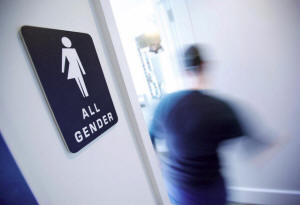|
Super Bowl glare fixes attention on Texas
'bathroom bill'
 Send a link to a friend
Send a link to a friend
 [January 27, 2017]
By Jon Herskovitz [January 27, 2017]
By Jon Herskovitz
AUSTIN, Texas (Reuters) - As Houston
readies to host the Super Bowl, a push by lawmakers in Texas to restrict
bathroom access for transgender people is raising fears the state may be
unable to score future major sporting events and could lose
championships on its books.
The proposed measure is similar to one enacted last year in North
Carolina that prompted the National Basketball Association to pull its
showcase 2017 All Star game from Charlotte, while the National
Collegiate Athletic Association moved seven championship events amid
economic boycotts estimated to have cost hundreds of millions of
dollars.
The financial hit in Texas, whose economy is bigger than Russia's and
boasts one of the nation's largest travel and tourism industries, is
forecast to be much bigger.
Influential business officials and activists say the legislation could
also hurt the state's ability to attract investment and is at odds with
the progressive tradition of its biggest cities.
The cost of the so-called "bathroom bill," which bars transgender people
from using restrooms that match their gender identity, could run as high
as $8.5 billion and result in a loss of 185,000 jobs in the first year
alone, according to the Texas Association of Business, a conservative
group that is the state's leading employer organization.

"It would be a blot on the reputation of the state of Texas, which many
of us have been working to change," said Annise Parker, who as Houston's
mayor from 2010 to 2016 was the first openly lesbian candidate elected
to lead a major U.S. city.
Parker, who served as mayor when Houston won hosting duties for Super
Bowl LI to be played on Feb. 5, said by just filing the measure, which
opponents decry as discriminatory, there has been damage to the image of
the state that serves as headquarters for more than 50 Fortune 500
companies ranging from Exxon Mobil to grocer Whole Foods.
Texas has several upcoming marquee sporting events that could be at risk
if the bathroom bill, known as the "Privacy Protection Act" or Senate
Bill 6, is approved.
The legislation's outcome is unlikely to be decided before the NCAA
women's Final Four basketball championship is held in Dallas this
spring. But it could affect the NCAA men's Final Four basketball
championship in San Antonio next year. The NCAA declined to comment.
That event's economic impact in the San Antonio area is estimated to be
$135 million, according to economist Steve Nivin at St. Mary's
University in San Antonio. Other estimates run as high as $234 million.
The Super Bowl is expected to bring the Houston area a net economic
benefit of around $350 million, according to the Host Committee.
ECONOMIC DOOM
Visit San Antonio, the city's independent convention and visitors
organization, said the bill is bad for business.
[to top of second column] |

A bathroom sign welcomes both genders at the Cacao Cinnamon coffee
shop in Durham, North Carolina, United States on May 3, 2016.
REUTERS/Jonathan Drake/File Photo

"Visit San Antonio is actively working with our state and regional
travel and industry partners to oppose SB 6 and any other
legislation that could cause San Antonio and Texas to be less
competitive and welcoming," Casandra Matej, the group's executive
director, told Reuters.
The Big 12 Conference, which in December plans to hold its football
championship game in Arlington at the stadium used by the Dallas
Cowboys, said in a statement it was tracking the legislation and
would, "at an appropriate time, discuss its impact with our member
institutions."
Under the measure, local governments would not be able to adopt
ordinances dictating bathroom and locker room policies for
businesses. Local governments also would be forbidden from
considering those policies when awarding contracts.
Texas Lieutenant Governor Dan Patrick, a Tea Party Republican, has
said the bathroom bill is a common-sense measure that protects
against sexual predators and is a top legislative priority. He
dismisses concern over any economic fallout.
"You have heard predictions of economic doom if we pass this bill,"
he told a news conference in January. "It is just more talk from the
opponents who have nothing else to say."
The bill is likely to pass the Republican-controlled Texas Senate,
but its fate in the House of Representatives is uncertain.
Speaker Joe Straus, a Republican who drives the agenda in that body,
has shown tepid support, saying there are worries in his San Antonio
district about what would happen to the 2018 Final Four if the bill
becomes law.
"We should be very careful about doing something that could make
Texas less competitive for investments, jobs and the highly skilled
workforce needed to compete," Straus said in a speech this month.
(Reporting by Jon Herskovitz; Additional reporting by Jim Forysth in
San Antonio; Editing by Colleen Jenkins and Alan Crosby)
[© 2017 Thomson Reuters. All rights
reserved.]
Copyright 2017 Reuters. All rights reserved. This material may not be published,
broadcast, rewritten or redistributed.
 |